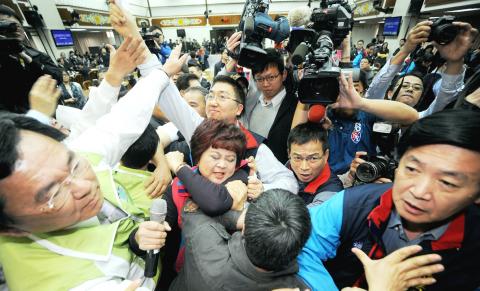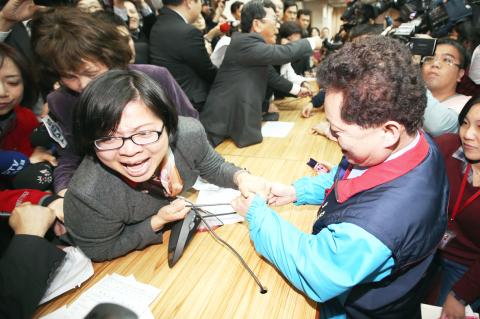The second day of a legislative meeting scheduled to review the cross-strait service trade pact was marked with clashes and condemnations between lawmakers of the two political camps.
“There may be differences in opinion between different parties, but these differences should be resolved through negotiation, not violence,” Chinese Nationalist Party (KMT) caucus whip Lin Hung-chih (林鴻池) told a press conference yesterday. “We condemn the Democratic Progressive Party [DPP] caucus for using violence against our caucus office director Chiang Kui-fang [江桂芳].”
Lin was referring to a scuffle which occurred in the afternoon, when DPP Legislator Chiu Yi-ying (邱議瑩) attempted to unplug a loudspeaker box belonging to the KMT caucus, as KMT lawmakers were speaking through loudspeakers, trying to interrupt the meeting.

Photo: Liu Hsin-de, Taipei Times
“I did not use violence against Chiang, I was trying to stop the KMT from interrupting the meeting. Chiang wanted to stop me from what I was doing, and I had to defend myself,” Chiu said.
As the tussle between Chiu and Chiang ensued, legislators from both camps rushed over, adding to more pushing and shoving.
Amid the chaos, KMT Legislator Alicia Wang (王育敏) collapsed and was rushed to the health center.

Photo: CNA
She was later diagnosed with several bone fractures in her arms and feet.
The conflict erupted as soon as DPP Legislator Chen Chi-mai (陳其邁), who presided over the meeting, announced the beginning the meeting at 9am.
About one minute before the official start, Lin and KMT legislators delivered a petition, asking that the meeting to reject the official record of Wednesday’s review of the service trade pact, saying that there should not be a meeting transcript since nothing happened during the meeting.
Chen refused to take the petition, saying the meeting had not started. However, after announcing the beginning of the meeting, he confirmed there were no issues with the transcript of the previous day, despite the verbal and written protest from KMT lawmakers.
As the meeting degenerated into chaos, Chen announced that the meeting would go into recess, and left the podium.
When Legislative Yuan staffers stepped down from the podium with Chen, several KMT legislators — notably Alex Fai (費鴻泰) — ran after them, trying to stop them from leaving, and accused them of not being neutral.
DPP legislators Chen Ting-fei (陳亭妃) and Lee Chun-yi (李俊俋) quickly moved to push Fai away, asking him “not to give staffers trouble.”
The meeting was again paused after the conflict between Chiu and Chiang, with Chen and his DPP colleagues again leaving the meeting room.
As Chen and DPP lawmakers did not return at the scheduled ending of the meeting at 5:30pm, KMT lawmakers declared the meeting adjourned, and said the caucus will hold meetings to review the services trade pact next week, when KMT Legislator Chang Ching-chung (張慶忠) is to serve as the rotating president of the Internal Administration Committee.
Meanwhile, the DPP caucus accused the KMT of resorting to lies and violence to block the review procedure.
Chen Chi-mai said the KMT caucus has been doing everything it could, including kicking Legislative Yuan staffers and blaming them for violation of neutrality and stealing away the registration form so that lawmakers could not speak in order, to compromise the meeting.
He also rejected the KMT’s claim that he failed to follow regulations and ignored Lin Hung-chih’s motion to reaffirm the proceedings.
“I was ready to accept [Lin’s] proposal, but he seemed to have a change of heart and hesitated. The next thing I knew, the scuffle between lawmakers began and he was never able to propose it again,” Chen Chi-mai said.
Additional reporting by Chris Wang

ANOTHER EMERGES: The CWA yesterday said this year’s fourth storm of the typhoon season had formed in the South China Sea, but was not expected to affect Taiwan Tropical Storm Gaemi has intensified slightly as it heads toward Taiwan, where it is expected to affect the country in the coming days, the Central Weather Administration (CWA) said yesterday. As of 8am yesterday, the 120km-radius storm was 800km southeast of Oluanpi (鵝鑾鼻), Taiwan’s southernmost tip, moving at 9kph northwest, the agency said. A sea warning for Gaemi could be issued tonight at the earliest, it said, adding that the storm is projected to be closest to Taiwan on Wednesday or Thursday. Gaemi’s potential effect on Taiwan remains unclear, as that would depend on its direction, radius and intensity, forecasters said. Former Weather Forecast

As COVID-19 cases in Japan have been increasing for 10 consecutive weeks, people should get vaccinated before visiting the nation, the Centers for Disease Control (CDC) said. The centers reported 773 hospitalizations and 124 deaths related to COVID-19 in Taiwan last week. CDC Epidemic Intelligence Center Director Guo Hung-wei (郭宏偉) on Tuesday said the number of weekly COVID-19 cases reported in Japan has been increasing since mid-May and surpassed 55,000 cases from July 8 to July 14. The average number of COVID-19 patients at Japan’s healthcare facilities that week was also 1.39 times that of the week before and KP.3 is the dominant

The Chinese Communist Party’s (CCP) working group for Taiwan-related policies is likely to be upgraded to a committee-level body, a report commissioned by the Mainland Affairs Council (MAC) said. As Chinese President Xi Jinping (習近平) is increasingly likely to upgrade the CCP’s Central Leading Group for Taiwan Affairs, Taiwanese authorities should prepare by researching Xi and the CCP, the report said. At the third plenary session of the 20th Central Committee of the CCP, which ended on Thursday last week, the party set a target of 2029 for the completion of some tasks, meaning that Xi is likely preparing to

US-CHINA TRADE DISPUTE: Despite Beijing’s offer of preferential treatment, the lure of China has dimmed as Taiwanese and international investors move out Japan and the US have become the favored destinations for Taiwanese graduates as China’s attraction has waned over the years, the Ministry of Labor said. According to the ministry’s latest income and employment advisory published this month, 3,215 Taiwanese university graduates from the class of 2020 went to Japan, surpassing for the first time the 2,881 graduates who went to China. A total of 2,300 graduates from the class of 2021 went to the US, compared with the 2,262 who went to China, the document showed. The trend continued for the class of 2023, of whom 1,460 went to Japan, 1,334 went to